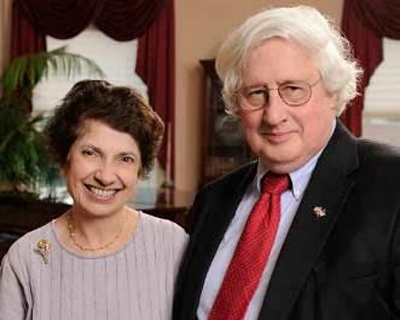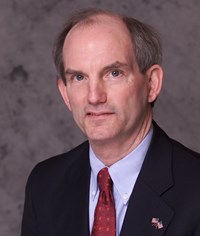During an average day in the Baltimore private practice of Dr. Allan D. Jensen, about 25 patients will sit and chat with the doctor. At least one will say something alarming. “I listen to their stories,” says Dr. Jensen, “and not a day goes by without something worrying me.”

For many years, he relied on a friend and colleague, Dr. Michael R. Redmond, as a sounding board for these concerns. The two served successive terms as presidents of the American Academy of Ophthalmology, and they served together as state delegates to the American Medical Association. Dr. Redmond, a pediatric ophthalmologist and a leader in advocacy and legislative work in the field, passed away in 2011. He is remembered by many for his reputation of unwavering integrity.
Thanks to a gift by Dr. Jensen and his wife, Claire, to honor their dear friend and his accomplishments, the Redmond name will carry on that reputation. With a $500,000 donation to the Foundation, the Jensens have established the Michael R. Redmond, MD Professionalism and Ethics Education Center.
The Redmond Center will build on the Academy’s existing Ethics Program, creating a more dynamic, relevnt and global resource center for ethics and professionalism. It will eventually include education for practice administrators and allied health professionals.
As Drs. Jensen and Redmond often discussed, modern medicine has ventured into unmapped territory. Advances in medical knowledge, technology and treatments are announced daily, even as shifting health care economics and policy rearrange the very landscape beneath them. New tools are introduced with great urgency and expectation, but little in the way of long-term studies or training for physicians. Without the right guidance, doctors risk harming the patients they’ve set out to help.
As a former member of the Maryland Healthcare Commission and past president of the state medical society, Dr. Jensen has examined these scenarios more closely than most, often with the help of Dr. Redmond. “Michael and I would share our angst over the ethical and professional issues in modern medicine,” Dr. Jensen says. “It was a bond between us.” “If something went wrong in the day’s practice, we would call each other up. It was a way to unwind,” he says. “When we were faced with difficult problems, we’d call each other and say, ‘How should I handle this?’”

Michael R. Redmond, MD
The Redmond Center will be a critical resource for these kinds of cases, he says – from the impact of health policy changes to the safety of new treatments to best practices for delegation of care, medical and billing records, and patient education. The Redmond Center will develop new courses, lectures, policies, opinions and guidelines to address the ethical and professional questions that ophthalmologists wrestle with today.
“Ethical issues come up every day that haven’t been covered in our residency or training programs. These are practical questions for every resident, intern and doctor to consider, not just members of an Ethics Committee,” says Dr. Jensen. “The key is making sure that we actually look at these ethical questions — that we don’t automatically assume we know the answer.” “These questions require some thought and some instruction,” he adds, “and someone to talk to us about them.”